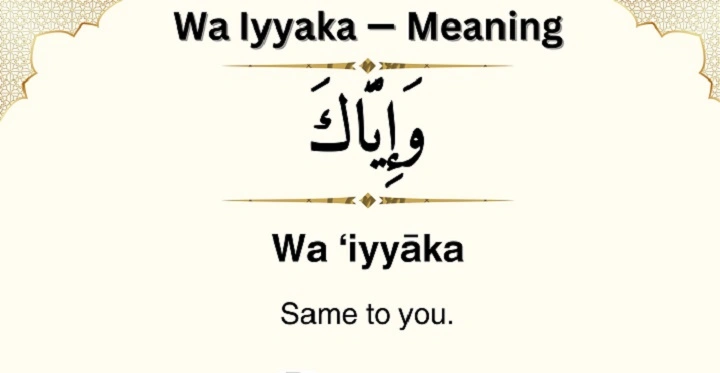The phrase “Wa Iyyaka” is commonly used in Arabic, and its meaning carries significant cultural and religious connotations. This phrase, which often appears in Islamic prayers and daily conversations, holds a deep-rooted tradition. In this article, we will explore the meaning of “Wa Iyyaka,” its usage, and the context in which it is used. By the end of this article, you will have a comprehensive understanding of this powerful Arabic expression.
Understanding the Meaning of Wa Iyyaka
The phrase “Wa Iyyaka” can be broken down into two parts: “Wa” and “Iyyaka.”
What Does “Wa” Mean?
In Arabic, the word “Wa” (و) means “and.” It is a conjunction that connects words or phrases. While it is commonly used to connect two items or concepts, in this context, it functions to link the phrase to the next part.
What Does “Iyyaka” Mean?
The word “Iyyaka” (إِيَّاكَ) comes from the root “ayya” (أي), meaning “you” in the context of emphasis. The full meaning of “Iyyaka” is “you alone” or “only you.” It is a direct and emphatic form of addressing someone, typically in a reverential or formal tone.
When combined, “Wa Iyyaka” translates to “And you (alone)” or “And you, too” with emphasis on the person being addressed. The meaning is often expressed as “And to you (be the favor)” or “And for you (be the favor)” in religious and cultural contexts.
Usage in Islamic Context
The phrase “Wa Iyyaka” holds a prominent place in Islamic prayer, specifically within the Surah Al-Fatiha (The Opening). It is a part of the supplication that Muslims recite during their daily prayers.
The Role of Wa Iyyaka in Surah Al-Fatiha
Surah Al-Fatiha is one of the most important chapters of the Qur’an, recited in every unit of the Muslim prayer (Salah). In the verse “Ihdina as-sirata al-mustaqim, sirata alladhina an’amta ‘alayhim ghayri al-maghdubi ‘alayhim wa la-ddallin” (Guide us to the straight path, the path of those upon whom You have bestowed favor, not of those who have evoked Your anger or of those who are astray),** the phrase “Wa Iyyaka” is a part of the prayer that connects the worshipper directly with Allah, asking for guidance and help from Him alone.
This phrase reflects the Islamic belief in Tawhid (the oneness of Allah) and is used to invoke Allah’s blessings and favor. In this context, the phrase emphasizes the exclusive nature of Allah’s mercy, as it is addressed to Allah alone.
Personal Connection in Duas (Supplications)
In many personal supplications or duas (prayers), “Wa Iyyaka” is often used to express gratitude or a plea for guidance. It can be said after making a supplication for one’s well-being, signifying the prayer’s intention is dedicated solely to Allah’s mercy and grace. For example, “Wa Iyyaka nas’alu al-jannah” (And to You alone we ask for Paradise).
Common Translations and Interpretations
While the phrase “Wa Iyyaka” has a straightforward meaning in Arabic, it can be interpreted in various ways depending on the context. Here are a few interpretations based on different contexts:
In the Context of Gratitude
In a conversational or casual setting, when someone offers a favor or good deed, the response “Wa Iyyaka” could mean “And to you too” or “The same to you.” It is a polite and appreciative response that acknowledges the other person’s actions. This usage is often seen in Arabic-speaking cultures, where exchanges of kindness are accompanied by such expressions.
In Islamic Blessings
In Islamic prayers, the meaning shifts slightly. “Wa Iyyaka” emphasizes the belief that all good comes from Allah and that no favor can be attributed to anyone else. It suggests that a believer is turning solely to Allah for help and blessing, and any good bestowed upon the person is solely from Him.
Cultural and Linguistic Significance
The phrase “Wa Iyyaka” plays an important role in both the religious and cultural life of Arabic-speaking communities. It is a reflection of the linguistic beauty and depth of the Arabic language, where phrases are often imbued with spiritual meaning.
In daily conversations, Arabs use “Wa Iyyaka” as an acknowledgment or response to gratitude. It carries with it not only a polite gesture but also a deeper meaning of emphasizing the mutual respect between the speaker and the listener.
Wa Iyyaka in Social Etiquette
In many social interactions, “Wa Iyyaka” is part of the etiquette when someone thanks another person. It’s a way of reciprocating kindness and reinforcing the relationship between individuals. Whether in casual settings or formal religious gatherings, “Wa Iyyaka” helps maintain the values of respect and mutual goodwill.
FAQs About Wa Iyyaka Meaning
What is the direct translation of “Wa Iyyaka”?
The direct translation of “Wa Iyyaka” is “And you (alone)” or “And to you (be the favor),” depending on context.
Where is “Wa Iyyaka” used in Islamic prayers?
“Wa Iyyaka” is found in the Surah Al-Fatiha, a key part of the daily Muslim prayers (Salah).
Can “Wa Iyyaka” be used in casual conversations?
Yes, “Wa Iyyaka” can be used in casual conversations as a polite and grateful response, especially when someone thanks you.
Does “Wa Iyyaka” have a specific religious connotation?
Yes, in the context of Islamic prayers, it emphasizes the belief in Allah’s exclusive mercy and grace.
How is “Wa Iyyaka” related to the concept of Tawhid?
“Wa Iyyaka” reflects the Islamic concept of Tawhid, which emphasizes the oneness of Allah, signifying that all good comes from Him alone.
The phrase “Wa Iyyaka” encapsulates much more than just a simple response. It carries deep meaning within Islamic traditions, personal supplications, and everyday exchanges in Arabic-speaking cultures. Whether used in religious contexts or casual conversations, it underscores the importance of acknowledging Allah’s blessings and reciprocating kindness. By understanding “Wa Iyyaka” in its various contexts, you gain insight into the profound linguistic and cultural significance of this beautiful Arabic expression.


